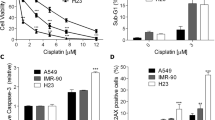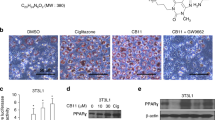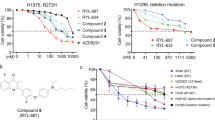Abstract
LKB1 is a novel candidate tumor suppressor gene in lung cancer. In this study, we evaluated the effect of cationic liposomes (LPs)-mediated LKB1 gene (LPs-pVAX-LKB1) on low-dose cisplatin (cis-diamminedichloroplatinum)-mediated antitumor activity in lung cancer, both in vitro and in vivo. Our study demonstrated that cationic LPs-mediated LKB1 gene therapy could sensitize the response of lung cancer cells to cisplatin, and significantly induce apoptosis and inhibit proliferation, invasion and metastasis, compared with control groups. Combined treatment with intratumoral administration of Lps-pVAX-LKB1 and intraperitoneal injection of low-dose cisplatin into subcutaneous A549 lung tumor xenograft resulted in significant (P<0.01) inhibition of tumor growth. Furthermore, combined treatment with intravenous injections of Lps-pVAX-LKB1 and intraperitoneal injection of low-dose cisplatin into mice bearing experimental A549 lung metastasis demonstrated significant (P<0.01) decrease in the number of lung metastatic tumor nodules. Mice life spans of combination treatment group were also dramatically prolonged, compared with controls. Further studies indicated that LKB1-enhancing cisplatin-mediated antitumor effects might be associated with the upregulation of p-p53 and p-JNK, and downregulation of p-mammalian target of rapamycin, matrix metalloproteinase (MMP)-2 and MMP-9. This study suggests that the combination of LKB1 gene therapy with low-dose cisplatin-based chemotherapy may be a potent therapeutic strategy for lung cancer.
This is a preview of subscription content, access via your institution
Access options
Subscribe to this journal
Receive 12 print issues and online access
$259.00 per year
only $21.58 per issue
Buy this article
- Purchase on Springer Link
- Instant access to full article PDF
Prices may be subject to local taxes which are calculated during checkout






Similar content being viewed by others
References
Jemal A, Bray F, Center MM, Ferlay J, Ward E, Forman D . Global cancer statistics. CA Cancer J Clin 2011; 61: 69–90.
Keshamouni V, Arenberg D, Kalemkeriam G . Lung Cancer Metastasis Novel Biological Mechanisms and Impact on Clinical Practice. Springer: New York, 2009.
Jemal A, Siegel R, Ward E, Murray T, Xu J, Smigal C et al. Cancer statistics, 2006. CA Cancer J Clin 2006; 56: 106–130.
Ramalingam SS, Owonikoko TK, Khuri FR . Lung cancer: new biological insights and recent therapeutic advances. CA Cancer J Clin 2011; 61: 91–112.
Non-Small Cell Lung Cancer Collaborative Group. Chemotherapy in non-small cell lung cancer: a meta-analysis using updated data on individual patients from 52 randomized clinical trials. Br Med J 1995; 311: 899–909.
Molina JR, Adjei AA, Jett JR . Advances in chemotherapy of non-small cell lung cancer. Chest 2006; 13: 1211–1219.
Johnson DH . Evolution of cisplatin-based chemotherapy in non-small cell lung cancer. Chest 2000; 117: 133s–137s.
Levine A . Single nucleotide polymorphisms in the p53 pathway. FEBS J 2009; 27: 61–61.
Nemunaitis J, Swisher SG, Timmons T, Connors D, Mack M, Doerksen L et al. Adenovirus-mediated p53 gene transfer in sequence with cisplatin to tumors of patients with non-small-cell lung cancer. J Clin Oncol 2000; 18: 609–622.
Ueda K, Kawashima H, Ohtani S, Deng W, Ravoori M, Bankson J et al. The 3p21.3 tumor suppressor NPRL2 plays an important role in cisplatin-induced resistance in human non-small-cell lung cancer cells. Cancer Res 2006; 66: 9682–9690.
Deng WG, Wu G, Ueda K, Xu K, Roth JA, Ji L . Enhancement of antitumor activity of cisplatin in human lung cancer cells by tumor suppressor FUS1. Cancer Gen Ther 2008; 15: 29–39.
Makowski L, Hayes DN . Role of LKB1 in lung cancer development. Br J Cancer 2008; 99: 683–688.
Shah U, Sharpless NE, Hayes DN . LKB1 and lung cancer: more than the usual suspects. Cancer Res 2008; 68: 3562–3565.
Ji H, Ramsey MR, Hayes DN, Fan C, McNamara T, Kozlowski P et al. LKB1 modulates lung cancer differentiation and metastasis. Nature 2007; 448: 807–810.
Koivunen JP, Kim J, Lee J, Rogers AM, Park JO, Zhao X et al. Mutations in the LKB1 tumour suppressor are frequently detected in tumours from Caucasian but not Asian lung cancer patients. Br J Cancer 2008; 99: 245–252.
Gao Y, Ge G, Ji H . LKB1 in lung cancerigenesis: a serine/threonine kinase as tumor suppressor. Protein Cell 2011; 2: 99–107.
Carretero J, Shimamura T, Rikova K, Jackson AL, Wilkerson MD, Borgman C et al. Integrative genomic and proteomic analyses identify targets for LKB1-deficient metastatic lung tumours. Cancer Cell 2010; 17: 547–559.
Sanchez-Cespedes M, Parrella P, Esteller M, Nomoto S, Trink B, Engles JM et al. Inactivation of LKB1/STK11 is a common event in adenocarcinomas of the lung. Cancer Res 2002; 62: 3659–3662.
Fan D, Ma C, Zhang H . The molecular mechanisms that underlie the tumor suppressor function of LKB1. Acta Biochim Biophys Sin 2009; 41: 97–107.
Vaahtomeri K, Mäkelä TP . Molecular mechanisms of tumor suppression by LKB1. FEBS Lett 2011; 585: 944–951.
Chen X, Wang X, Wang Y, Yang L, Hu J, Xiao W et al. Improved tumor-targeting drug delivery and therapeutic efficacy by cationic liposome modified with truncated bFGF peptide. J Control Release 2010; 145: 17–25.
Yee DS, Tang Y, Li X, Liu Z, Guo Y, Ghaffar S et al. The Wnt inhibitory factor 1 restoration in prostate cancer cells was associated with reduced tumor growth, decreased capacity of cell migration and invasion and a reversal of epithelial to mesenchymal transition. Mol Cancer 2010; 9: 162–175.
Wei YQ, Wang QR, Zhao X, Yang L, Tian L, Lu Y et al. Immunotherapy of tumors with xenogeneic endothelial cells as a vaccine. Nat Med 2000; 6: 1160–1166.
Wangpaichitr M, Wu C, You M, Kuo MT, Feun L, Lampidis T et al. Inhibition of mTOR restores cisplatin sensitivity through down-regulation of growth and anti-apoptotic proteins. Eur J Phar 2008; 591: 124–127.
Mabuchi S, Kawase C, Altomare DA, Morishige K, Sawada K, Hayashi M et al. mTOR is a promising therapeutic target both in cisplatin-sensitive and cisplatin-resistant clear cell carcinoma of the ovary. Clin Cancer Res 2009; 15: 5404–5413.
Stewart DJ . Mechanisms of resistance to cisplatin and carboplatin. Crit Rev Oncol Hematol 2007; 63: 12–31.
Nguyen DM, Spitz FR, Yen N, Cristiano RJ, Roth JA . Gene therapy for lung cancer: enhancement of tumor suppression by a combination of sequential systemic cisplatin and adenovirus-mediated p53 gene transfer. J Thorac Cardiovasc Surg 1996; 112: 1372–1377.
Shackelford DB, Shaw RJ . The LKB1-AMPK pathway: metabolism and growth control in tumor suppression. Nat Rev Cancer 2009; 9: 563–575.
Cheng H, Liu P, Wang ZC, Zou L, Santiago S, Garbitt V et al. SIK1 couples LKB1 to p53-depengdent anoikis and suppresses metastasis. Sci Signal 2009; 2: 1–11.
Lee JH, Koh H, Kim M, Park J, Lee SY, Lee S et al. JNK pathway mediates apoptotic cell death induced by tumor suppressor LKB1 in Drosophila. Cell Death Differ 2006; 13: 1110–1122.
Tournier C, Hess P, Yang DD, Xu J, Turner TK, Nimnual A et al. Requirement of JNK for stress-induced activation of the cytochrome c-mediated death pathway. Science 2000; 288: 870–874.
Westermarck J, Kähäri M . Regulation of matrix metalloproteinase expression in tumor invasion. FASEB J 1999; 13: 781–792.
Zeng ZS, Cohen AM, Guillem JG . Loss of basement membrane type Iv collagen is associated with increased expression of metalloproteinases 2 and 9 (MMP-2 and MMP-9) during human colorectal tumorigenesis. Carcinogenesis 1999; 20: 749–755.
Karam AK, Santiskulvong C, Fekete M, Zabih S, Eng C, Dorigo O . Cisplatin and PI3kinase inhibition decrease invasion and migration of human ovarian carcinoma cells and regulate matrix-metalloproteinase expression. Cytoskeleton (Hoboken) 2010; 67: 535–544.
Urso L, Muscella A, Calabriso N, Vetrugno C, Jiménez E, Montiel M et al. Effects of cisplatin on matrix metalloproteinase-2 in transformed thyroid cells. Biochem Pharmacol 2010; 79: 810–816.
Upadhyay S, Liu C, Chatterjee A, Hoque MO, Kim MS, Engles J et al. LKB1/STK11 suppresses cyclooxygenase-2 induction and cellular invasion through PEA3 in lung cancer. Cancer Res 2006; 66: 7870–7879.
Zhuang ZG, Di GH, Shen ZZ, Ding J, Shao ZM . Enhanced expression of LKB1 in breast cancer cells attenuates angiogenesis, invasion, and metastatic potential. Mol Cancer Res 2006; 66: 7870–7879.
Acknowledgements
This study was partly supported by the National Science and Technology Major Projects of New Drugs (2012ZX09103301-009). We thank Xiang Chen, Xiaolan Su, Yongqiu Mao and Qiaorong Huang (State Key Laboratory of Biotherapy and Cancer Center, West China Hospital, Sichuan University) for technical assistance.
Author information
Authors and Affiliations
Corresponding author
Ethics declarations
Competing interests
The authors declare no conflict of interest.
Rights and permissions
About this article
Cite this article
Ou, W., Ye, S., Yang, W. et al. Enhanced antitumor effect of cisplatin in human NSCLC cells by tumor suppressor LKB1. Cancer Gene Ther 19, 489–498 (2012). https://doi.org/10.1038/cgt.2012.18
Received:
Revised:
Accepted:
Published:
Issue Date:
DOI: https://doi.org/10.1038/cgt.2012.18
Keywords
This article is cited by
-
Attenuated LKB1-SIK1 signaling promotes epithelial-mesenchymal transition and radioresistance of non–small cell lung cancer cells
Chinese Journal of Cancer (2016)
-
Synergistic effects of eukaryotic coexpression plasmid carrying LKB1 and FUS1 genes on lung cancer in vitro and in vivo
Journal of Cancer Research and Clinical Oncology (2014)



